|
|
|
Sort Order |
|
|
|
Items / Page
|
|
|
|
|
|
|
| Srl | Item |
| 1 |
ID:
113896
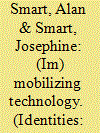

|
|
|
|
|
| Publication |
2011.
|
| Summary/Abstract |
Immobilization is generally thought to result from power and poverty acting against the acceleration produced by science and technology. In this article we explore neglected countervailing trends, such as quarantines, health inspections, and import bans, where science has the effect of restricting mobility, which we refer to as "slow science." As well as increasing mobility, science can be mobilized for political projects of restricting movement, but this possibility is neglected because of cultural assumptions fundamental to modernity. Both science and technology can be enrolled for projects of slowing mobility as well as increasing mobility. Drawing on actor-network theory, we examine the enrolment of science and technology into restricting movement in various ways. These issues are explored first through an overview of the neglected genealogy of the ways in which science and technology have slowed movement, particularly across national borders, and second through a short case study of how food safety concerns affect the movement of beef across borders. The case study discusses how "slow science" diagnoses threats posed by mobility and develops technologies to immobilize certain entities. These entities have almost always been biological organisms (including humans) or their products due to the self-reproducing qualities of invasive species, bacteria, or viruses. Uniquely, WTO rules about food require that restrictions be based on sound science, resulting in trade disputes focused on scientific interpretations.
|
|
|
|
|
|
|
|
|
|
|
|
|
|
|
|
| 2 |
ID:
113895


|
|
|
|
|
| Publication |
2011.
|
| Summary/Abstract |
In this introduction, we outline the general conceptual framework that ties the various contributions to this special issue together. We argue for the importance of anthropology to "take on" mobility and discuss the advantages of the ethnographic approach in doing so. What is the analytical purchase of mobility as one of the root metaphors in contemporary anthropological theorizing? What are the (dis)advantages of looking at the current human condition through the lens of mobility? There is a great risk that the fast-growing field of mobility studies neglects different interpretations of what is going on, or that only patterns that fit the mobilities paradigm will be considered, or that only extremes of (hyper)mobility or (im)mobility will be given attention. The ethnographic sensibilities of fieldworkers who learn about mobility while studying other processes and issues, and who can situate movement in the multiple contexts between which people move, can both extend the utility of the mobilities approach, and insist on attention to other dynamics that might not be considered if the focus is first and last on (im)mobility as such. In this special issue, we do not want to discuss human mobility as a brute fact but rather analyze how mobilities, as sociocultural constructs, are experienced and imagined.
|
|
|
|
|
|
|
|
|
|
|
|
|
|
|
|
| 3 |
ID:
113892
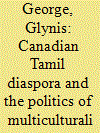

|
|
|
|
|
| Publication |
2011.
|
| Summary/Abstract |
This article explores Tamil diasporic engagement in Toronto, at the turn of the Sri Lankan struggle in 2009, to foreground the contested and transnational character of Canadian multiculturalism. It asks whether Canadian multicultural discourse provides a space for social and political identity-making within the Tamil-Canadian Diaspora. The article then sketches the way multiculturalism informed Tamil-Canadian identity-making amongst young and older Tamil-Canadians prior to these events. It explores how diasporic identity was then crystallized in 2009 through media and political responses within the mainstream and the Diaspora itself. The article argues that security discourses dramatically prefigured the terms of engagement for Tamil-Canadians during the final months of the civil war in Sri Lanka. It concludes by drawing attention to the transformative possibilities of multiculturalism and the way the diasporic lens that this case study uses may contribute to this discussion.
|
|
|
|
|
|
|
|
|
|
|
|
|
|
|
|
| 4 |
ID:
113890


|
|
|
|
|
| Publication |
2011.
|
| Summary/Abstract |
This article analyzes popular narratives surrounding the theme of drug lords in the Mexican border city of Juarez and their multifaceted social, ideological, and material effects. This analysis takes into consideration the historical context of eruptions of violence that Juarez has endured in the last few years. Complex formations of the Mexican identity are now being reformulated in hierarchical, gendered, and racialized identities, which project the very strong and powerful social frictions currently emerging from complex socioeconomic factors resulting in mass poverty and migration. These elements are evinced in the narco-narratives within their violent contexts. However, violence in Juarez must not be interpreted as upsurges outside the control of the state, but rather as byproducts of conflict within it (see Das and Poole 2004). Thus, on the border, Juarez becomes a central site, not a periphery, in which economic and political forces materialize in the middle of complex social dynamics.
|
|
|
|
|
|
|
|
|
|
|
|
|
|
|
|
| 5 |
ID:
113886
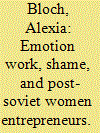

|
|
|
|
|
| Publication |
2011.
|
| Summary/Abstract |
Drawing on ethnographic research among Russian women traders or "shuttle traders" (chelnoki), I examine discourses on shame as a type of emotion work and consider links to ideal gender roles among Russian women entrepreneurs. In a post-Soviet era increasingly shaped by transnational mobility, as well as by a persistent legacy of Soviet sensibilities, a focus on emotion among women traders provides an ideal lens for considering what travels between eras marked by distinct ideologies, between nation-states, and between public and domestic spaces. A discourse of shame links Soviet sensibilities of proper labor and contemporary gender sensibilities that continue to elevate men as breadwinners; thus, a focus on shame enables us to see the contradictory ways in which women are positioned in local and global economies in the 2000s. This case shows how Russian women's insertion into the global economy beginning in the early 1990s has required emotion work that is similar to that required in other locations where global capitalism has brought about reconfigurations of work lives and required people to renegotiate gender roles, expressions of power, and the meaning of labor in their lives.
|
|
|
|
|
|
|
|
|
|
|
|
|
|
|
|
| 6 |
ID:
113900
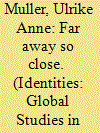

|
|
|
|
|
| Publication |
2011.
|
| Summary/Abstract |
Race and nation have been difficult concepts in Germany since the Holocaust. Although race has seemingly disappeared from public discourse, the concept is very present in the narrative construction of white German national identities. In fact in Germany, race, and more specifically whiteness, disappears into a national naming. On the basis of a qualitative study on women activists, I examine to what extent the research participants struggle with the racialized discourse on German identity and what this struggle looks like. Using John Hartigan's (2000) approach to analyzing ethnographic accounts of whiteness, I show how a racialization of German identity plays out in complex and complicated ways. On the one hand, the narratives are complicit with a racialized Germanness, yet on the other hand, the idea of a unified, white, cultural community is being challenged. To move toward a postcolonial narrative of Germanness that includes Germany's history of colonialism as well as fascism, we need to move away from race, but we also need to move toward race. A starting point would be provided by focusing on racism, not as a fringe issue of German society but rather as an urgent matter that is located at the centre of German politics and is actively shaping its history.
|
|
|
|
|
|
|
|
|
|
|
|
|
|
|
|
| 7 |
ID:
113894
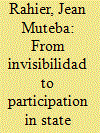

|
|
|
|
|
| Publication |
2011.
|
| Summary/Abstract |
In this article I briefly discuss the process that led in 1998 to the first Ecuadorian Constitution to adopt multiculturalism as a fundamental principle in its description of the nation and that for the first time gave special collective rights to Indigenous peoples and, in a less obvious way, to Afro-Ecuadorians. I then discuss some of the processes by which the second multicultural Constitution was adopted in 2008 in Ciudad Alfaro by a Constituent Assembly dominated by the party Alianza País, founded by the current President, Rafael Correa, a proponent of "21st century socialism." My discussions are done with the objective of commenting on the Afro-Ecuadorian activism and political organizing that took place since the late 1970s and also right before or, for the 2008 Constitution, during the actual processes of constitutional writing. I discuss Afro-Ecuadorian participation in corporatism, which mostly developed since the end of the 1990s along with the corporatist integration of other sectors of Ecuadorian society, including Indigenous groups and workers' unions. I show that Afro-Ecuadorian influences on, and participation in, the process that led to the adoption of the 2008 Constitution was in fact corporatist. I conclude that if it is true that current corporatist practices and the existence of the CODAE make it more difficult to represent and theorize Afro-Ecuadorians as the country's "ultimate Others," particularly when considering the rather successful Afro-Ecuadorian participation in the 2008 Constitutional processes, it is not less true that Ecuadorian civil society still has a long way to go to end its long history of anti-black racism.
|
|
|
|
|
|
|
|
|
|
|
|
|
|
|
|
| 8 |
ID:
113885
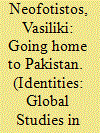

|
|
|
|
|
| Publication |
2011.
|
| Summary/Abstract |
In this article I explore the claim that post-independence Macedonia is a cornerstone of European civilization (a traditional Greek claim) and analyze efforts to assert the country's position in the international arena as a "modern" and authentically Western state deserving of membership in the European Union. Such efforts involve the establishment of ties between Macedonians and the Hunzukuts, who live on the remote Hindu Kush Mountains in Pakistan and claim to be descendants of Alexander the Great. I also analyze comparable initiatives, sponsored in recent years by the Greek state, to prove ties between Greeks and the Kalasha, who also live in remote areas of Pakistan and believe that they are descended from Alexander the Great. Greece and post-independence Macedonia offer us insights into the populist underpinnings of the nationalist promotion of a European identity presented as rooted in the East.
|
|
|
|
|
|
|
|
|
|
|
|
|
|
|
|
| 9 |
ID:
113897


|
|
|
|
|
| Publication |
2011.
|
| Summary/Abstract |
Studies of internal migration in contemporary China frequently focus on the movement of rural people to urban centers, while studies of Chinese tourism concentrate on the mobility of urban travelers. These approaches to mobility coincide neatly with established understandings of modernity, despite the fact that the Chinese government has tried to promote certain forms of rural modernization without mobilization-hence the national slogan "leave the fields without leaving the countryside." This article complicates the relationship between modernity and mobility in China by examining mobility from the perspective of returned migrants in rural, ethnic minority tourism villages. Through the analysis of five migrants' stories of travel, I explore the ordering of mobility, or how differing types of mobility come to be re-signified in times of immense social change and the consequences of these symbolic shifts on local understandings of ethnic identity and rural livelihoods. My argument builds on analytical frameworks of mobility in post-reform China by examining how mobility itself has been ordered in ways that reveal particular desire, inequalities, and power relations. By exploring how mobility both orders social relationships and how different forms of mobility, such as tourism or migration, come to be ordered in relation to each other, I draw attention to how mobility, and by extension immobility, generates the conditions of possibility for tourism village residents to make sense of the potential and paradoxes of rural, ethnic tourism development in contemporary China.
|
|
|
|
|
|
|
|
|
|
|
|
|
|
|
|
| 10 |
ID:
113891
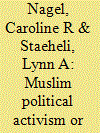

|
|
|
|
|
| Publication |
2011.
|
| Summary/Abstract |
Scholarship on Muslim political mobilisation in the West has developed as an important counterpoint to public discourse, which has tended to cast Muslims as a threat to social cohesion, liberal democracy, and national security. But even as scholarly literature has shed light on civic participation among Muslims, it has sidelined the diversity of political identities and values that motivate them. Most, if not all, Muslims in the West find their identities politicised in some way, but the question of whether this leads to a consensus amongst Muslims about the role of religion in public life often remains unexamined. In this article we draw on interviews with seventy-eight activists in Britain and the United States who are both Muslim and Arab to complicate ideas about the political mobilisation of Muslims in the West. Respondents, we show, are far from unified in their views on religion as a basis for political action and mobilisation. Some are keen to place Islam squarely in mainstream political spaces; most, however, are insistent that Islam should remain a private faith and identity and that political mobilisation should take place under the aegis of Arabness or other 'secular' identities. Using theoretical perspectives on the public sphere, we explain the complexity of our respondents' political identities and activism. Our overall aim is to broaden perspectives on the ways in which people from Muslim backgrounds participate in public, political life in Western contexts.
|
|
|
|
|
|
|
|
|
|
|
|
|
|
|
|
| 11 |
ID:
113893


|
|
|
|
|
| Publication |
2011.
|
| Summary/Abstract |
This article discusses the ways in which white, male, United States soldiers make sense of both themselves and Iraqi others. Drawing from qualitative interviews with twenty-four said soldiers from southern Indiana, most of whom having deployed to Iraq, it is shown how these soldiers perform gendered and racialized Orientalist discourses to rationalize United States empire and in particular the military occupation of Iraq. Specifically, imperialist discourses that imagine a superior "us" and an inferior "them" and understand United States state violence as ultimately a Western humanitarian "rescue" are shown to be powerful cultural logics in the sense-making practices of the interviewed soldiers. This article then is concerned with what others have called "practical Orientalism"-or the ways in which formal and official Orientalist discourses are adopted by everyday actors.
|
|
|
|
|
|
|
|
|
|
|
|
|
|
|
|
| 12 |
ID:
113898
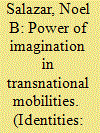

|
|
|
|
|
| Publication |
2011.
|
| Summary/Abstract |
At the roots of many travels to distant destinations, whether in the context of tourism or migration, are historically laden and socioculturally constructed imaginaries. People worldwide rely on such imaginaries, from the most spectacular fantasies to the most mundane reveries, to shape identities of themselves and others. These unspoken representational assemblages are powerful because they enact and construct peoples and places, implying multiple, often conflicting, representations of Otherness, and questioning several core values multicultural societies hold, by blurring as well as enforcing traditional territorial, social, and cultural boundaries. What are the contours of power, agency, and subjectivity in imaginaries of transnational mobility and the intersecting social categories those visions both reify and dissolve? Ethnographic studies of human (im)mobility provide an innovative means to grasp the complexity of the global circulation of people and the world-making images and ideas surrounding these movements. As a polymorphic concept, mobility invites us to renew our theorizing, especially regarding conventional themes such as culture, identity, and transnational relationships. This article critically analyzes some preliminary findings of an ongoing multisited research project that traces how prevalent imaginaries of transnational tourism to and migration from the "global South" are (dis)connected. I suggest anthropology has unique contributions to make to the current debate in the social sciences by ethnographically detailing how mobility is a contested ideological construct involving so much more than mere movement.
|
|
|
|
|
|
|
|
|
|
|
|
|
|
|
|
| 13 |
ID:
113888


|
|
|
|
|
| Publication |
2011.
|
| Summary/Abstract |
This essay offers a comparative reading of two ethnographies, Ida Susser's AIDS, Sex, and Culture: Global Politics and Survival in Southern Africa (2009), a multisited text focused on community responses to dynamics of HIV/AIDS prevention and treatment in Southern Africa, and Philippe Bourgois and Jeff Schonberg's Righteous Dopefiend (2009), a photo-ethnographic exploration of lumpen subjectivity within an encampment of homeless drug addicts in San Francisco. Pointing out these texts' common focus on circumstances of the precarious and marginal poor under conditions of neoliberalization, social conditions shaping dynamics of HIV prevention, and poor people's negotiations of affliction and structural violence, this essay highlights the theoretical and practical effects of these books' divergent methodologies, scopes of analysis, and differing degrees of emphasis on subjective experience as well as women's experiences. It also considers a key commonality across these texts: their attention to the role of historical experience and political-economic context in shaping responses to affliction and structural violence.
|
|
|
|
|
|
|
|
|
|
|
|
|
|
|
|
| 14 |
ID:
113887
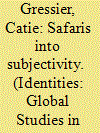

|
|
|
|
|
| Publication |
2011.
|
| Summary/Abstract |
The elite safari lodges in Botswana's Okavango Delta provide an intriguing site through which to explore processes of identity construction, as people from vastly different backgrounds meet and explore ontological possibilities through and against each other. Drawing on a dinner table dispute between an African American tourist and his white Motswana guide, I explore contested notions of what constitutes African identities. The encounter shows that colonial histories and the racialization of space continue to be central to African identity politics, and I describe how white citizens' claims to belonging are challenged on these grounds. In response to such challenges, white Batswana assert a strongly nationalistic identity, distancing themselves from other southern African white populations and their colonial histories. They staunchly defend their claims to belonging through mobilising a partial view of Botswana's history and contemporary sociopolitical conditions, which has made possible a deep sense of emplacement within the social and natural environments of the Okavango.
|
|
|
|
|
|
|
|
|
|
|
|
|
|
|
|
| 15 |
ID:
113889


|
|
|
| 16 |
ID:
113899
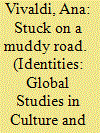

|
|
|
|
|
| Publication |
2011.
|
| Summary/Abstract |
This article explores how the Toba, an indigenous group in the North of Argentina, shape places and an urban subjectivity in the frictions of their mobility between villages, the urban barrio (neighborhood), and the periurban bush. I argue that the experience of Toba moving to the city is better understood as frictions between the Toba desire to progress in the city, the organization of difference in space, and their multiple movements "back" to the villages. In addition, I analyze their contemporary hunting trips, which take urban Toba to the nearby bush, as a mobility that shapes a form of indigeneity engaged with access to both the city center and the bush. This practice confronts them with ranch owners and police but reconnects the barrio and the bush by traversing them. If frictions emerge between forces that trigger movement and forces that slow that movement down, in the frictions of mobility the Toba have at once shaped their position in the city and overflowed its limits.
|
|
|
|
|
|
|
|
|
|
|
|
|
|
|
|
| 17 |
ID:
113901
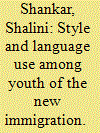

|
|
|
|
|
| Publication |
2011.
|
| Summary/Abstract |
In this article I consider "style" as a linguistic and cultural concept that can demonstrate how identities performed through language use are linked to topics of central concern in studies of immigrant youth, including racial and ethnic formation, generational cohorts, acculturation, assimilation, and gender. I draw on anthropological and sociolinguistic approaches to style not generally considered in migration studies and present ethnographic data of two cliques of Desi (South Asian American) teens in a Northern California high school. I argue that analyses of youth style can substantially complicate assimilation frameworks by highlighting the ways in which young peoples' linguistic practices may not fit neatly into commonly used analytical categories of "immigrant" and "American." Focusing on how political economy and local histories inform power and difference that shape migration experiences for youth, the article moves beyond routinely examined areas of heritage language retention and loss to analyze the significance of youth performances of heritage languages as well as English.
|
|
|
|
|
|
|
|
|
|
|
|
|
|
|
|
|
|
|
|
|